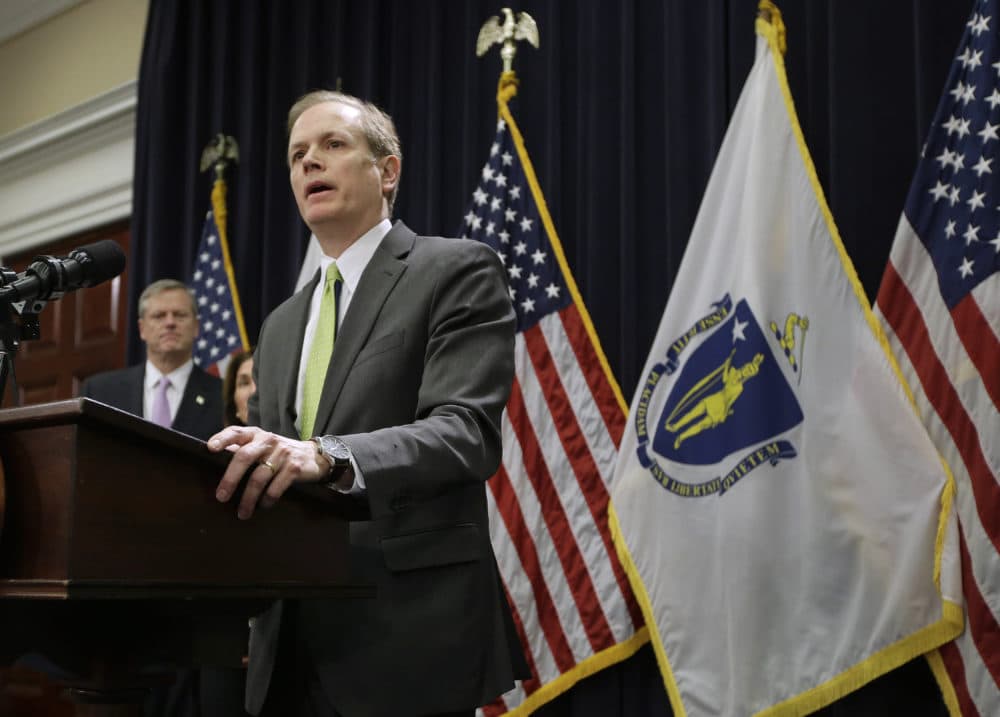Advertisement
Education Funding At Center Of Gov. Baker Budget Package

Gov. Charlie Baker is proposing a number of changes to the way school funding is calculated and some new funding for college students.
At the heart of the proposals for K-12 education are changes to the so-called foundation budget, which is the formula the state uses to calculate the minimum amount which each district is required to spend on educating its students.
Education Secretary Jim Peyser said the changes would add up to a $1.1 billion increase in current dollars, phased in over seven years. That would translate into a $200 million increase next fiscal year, without adjusting for inflation.
A 2015 state-commissioned report (PDF) found that Massachusetts was underestimating that minimum level by $1 billion each year, and made several recommendations to update the law.
"It's good to see the governor acknowledging the underfunding of our schools," said Lisa Guisbond, executive director of Citizens for Public Schools and a leader of the Fund Our Future Campaign. "But I'm concerned that there's a lack of urgency about addressing this issue."
Guisbond said seven years is too long to phase in funding for students.
“It doesn’t reflect the urgency of the situation: the students who for years lacked librarians and social workers and counselors and nurses. They can't wait," she said.
Groups like Fund Our Future are backing legislation filed by Sen. Sonia Chang-Diaz, which would implement all of the Foundation Budget Review Commission Recommendations. A similar bill collapsed last summer, despite widespread bipartisan support.
The Baker administration proposal would increase funding in four key areas identified by the commission: health care, low-income students, English learners and special education.
Advertisement
However, critics said the administration is currently undercounting the number of low-income students in the state and that the funding increases do not go far enough, particularly when it comes to low-income students and English learners.
"[M]ost shockingly, it fails to even come close to honoring the guidelines of the Foundation Budget Review Commission with respect to high-poverty districts and closing opportunity gaps," read a joint statement by a number of education groups and elected officials including Lawrence Mayor Daniel Rivera and Sen. Chang-Diaz. "This proposal shorts each disadvantaged child by thousands of dollars compared to the recommendations of that bipartisan commission."
Secretary Peyser said that 85 percent of the proposed funding increases would go to the districts with the highest concentration of low-income students.
The governor's proposal would also allow the education commissioner to withhold state funding from underperforming district administrators if its schools are not making enough progress on turnaround efforts.
The Massachusetts Teachers Association said the proposal "gives the state new weapons to force districts to implement changes against the wishes of the community."
College Funding
On higher education, Baker is proposing a $100 million trust fund for students entering Massachusetts colleges starting this fall. Students could use the money to reduce college costs, get paid for internships, and do co-ops.
A quarter of that funding would be set aside for scholarships for students in "proven college success programs" at public and private four-year colleges or universities. Another $25 million would be earmarked for students transferring from community college to a four-year public college.
"These students can go to a two-year campus and then move to a four-year campus," said Higher Education Commissioner Carlos Santiago. "Their credits will count as they go forward and they will be provided financial support as they proceed, so it really does focus on completing and getting students through the system as quickly as possible."
The proposals would be funded through sales tax revenue.
It also includes $15 million to expand Early College programs in which high school students take college-level courses.
"Students take rigorous college courses while they're in high school, and that reduces their costs when they get into college," said Santiago. "It also is a clear mechanism for students to succeed in college."
University of Massachusetts President Marty Meehan praised the investment in internships and co-ops.
"Experiential learning is extremely important to students at the University of Massachusetts, and I believe that to the extent that we can get more students engaged in internships and co-ops, the better that that experience is going to be," he said.
He also pointed to Baker's proposal to fund union contracts. The cost-of-living increases in these contracts are set by the governor's office, and in the past the Legislature has not always fully funded them, leaving the university to cover the costs, often by raising tuition and fees on students.
"We're very happy with the proposal from the governor," Meehan said. "Among the many things that we're most appreciative is the fact that the governor's budget fully funds collective bargaining."
Meehan said that will help UMass keep tuition lower. Baker's administration will ask public colleges and universities to reduce student charges.
But most Massachusetts students attending public colleges and universities won't be getting any help from the state in this budget.
"We see that it's better than last year, but that's not saying very much," said Zac Bears, executive director of Public Higher Education Network of Massachusetts, or PHENOM, a network of advocates for more public funding of higher ed. "There's some very modest increases to the budgets for the community colleges, state universities and the UMass system, and there's some one-time revenue that is spread over three years to go to some specific programs, but neither of these really address the scope of the funding and cost crisis that's facing students and families at our public colleges."
State support for public higher education has declined for decades. State appropriations now account for only 21 percent of UMass Amherst's operating budget, for example. As a result, students have borne an increasing share of the costs.
"This budget will not address the massive cuts in tuition support for students and it's not going to address the fastest-growing costs in the country and the second-fastest student debt burden for public college graduates in the country," said Bears. "We have a really serious crisis here."

